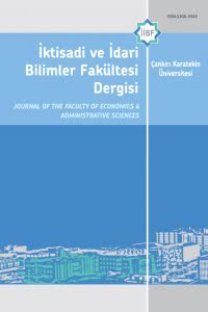Evaluating efficiency of Tehran stock exchange: Case study for Top Fifty most active companies (TSE-50)
Tahran Borsası nın verimliliğinin değerlendirilmesi: En aktif 50 Şirket örneği
___
- Allahyari, A. (2008). Examining the weak- form efficiency of capital markets in the Tehran Stock Exchange. Stock Exchange Quarterly, 4, 75- 108.
- Abbasian, A., & Zolfaghari, M. (2013). Dynamic analysis of poor performance in Tehran Stock Exchnage by the Kalman filter. Journal of Economic researches and Policies , 21 (65), 231 - 154.
- Akbar, U., & Muhammad, N. (2013). Is Pakistan Stock Market moving towards Weak- form efficiency? Evidence from the Karachi Stock Exchange and the Random Walk Nature of free - oat of shares of KSE 30 Index, Available at: http://mpra.ub.uni - muenchen.de/49128/.
- Arouri, M., Jawadi, F., & D. Nguyen. (2010), The Dynamics of Emerging Stock Markets: Empirical Assessments and Implications , Springer.
- Brockwell, P.J., & Davis, R.A. (1991). Time Series: Theory and Methods , 2 edition, Springer Verlag.
- Broges, M. (2010). Efficient Market Hypothesis in European Stock Markets. European Journal of Finance, 16, 711 - 726.
- Campbell, J.Y. LO, W. & Mackinlay, C. (1997). The Econometrics of Financial Markets , Princeton University.
- Chow, V. K. & Denning, K. C. (1993). A simple multiple variance ratio test, Journal of Econometrics , 58(3), 385- 401.
- Cootner, P. H. (1962). Stock Prices: Random vs. Systematic Changes, Industrial Management Review, 3(2), 24- 45.
- Dobbins, Richard, Stephen Witt & John Fielding. (1994), Portfolio Theory and Investment Management , 2d, Blackwell.
- Dorina, L. & Simina, U. (2007). Testing Efficiency of the Stock Market Emerging Economies, Faculty of Economics and Business Administration, Babes - Bolyai University, Romania, Working Paper, 827- 831.
- Dragotă V. & Mitrică, E. (2004). Emergent Capital Markets' Efficiency: The Case of Romania, European Journal of Operational Research, 155, 353 - 360.
- Dragotă, V. Stoian, A. Pele, D.T., Mitrică, E. & Bens afta, M. (2007). Development of Romanian Capital Market: Evidences on Informational Efficiency, available at http://papers.ssrn.com/sol3/papers.cfm?abstract_id=2191764.
- Durlauf, S.N., & Phillips, P.C.B. (1988). Trends Versus Random Walks In Time Series Analysis, Econometrica, 56(6).
- Fama, E. (1970). Efficient Capital Market: A Review of Theory and Empirical Work, Journal of Finance, (25), 383 417.
- Fama, E. (1991). Efficient Capital Markets: II, Journal of Finance, 46, 1575- 1617.
- Fama, E. & French, K. (1988). Permanent and Temporary Components of Stock Prices, The Journal of Political Economy, 96(2). 246- 273.
- Frankfurter, G.M., & Mcgoum, E.G. . (1996). Toward Finance with Meaning the Methodology of Finance: What it is What it Can be, JAI Press Inc.
- Lo, A., & Mackinlay, C. (1988). Stock Market Prices do not Follow Random Walks: Evidence from a Simple Specification Test, The Review of Financial Studies , 1(1), 41 - 66.
- Mandelbrot, B. (1963). The Variation of Certain Speculative Prices, The Journal of Business , 36(4), 394- 419.
- Muth, J. (1961). Rational Expectations and the Theory of Price Movements, Econometrica, 29(3), 315- 335.
- Pele, D. T., & Voineagu, V. (2008). Testing Market Efficiency via Decomposition of Stock Returns. Application to Romanian Capital Market, Romanian Journal for Economic Forecasting, 5(3), 63 - 79.
- Osamah, M. A. & Ding, D. (2007). A New Variance Ratio Test of Random Walk in Emerging Markets, Financial Review, 42, 303 - 317.
- Srinivasan, P. (2010). Testing Weak- Form Efficiency of Indian Stock Markets, Asian Journal of Research in Business Management, l( 1 ) , 134- 140.
- Salimifar, M., & Shirzoor, Z. (2010). Measuring the informational efficiency of Stock market variance ratio test, journal of knowledge and Development , 31, 29- 58.
- Tehrani, R., &Tehrani, M. R. (2009)S. Volatility Forecasting Performance Comparison of Different Models on the Tehran Stock Exchange and Analyzing the Impact of Some Factors on the Behavior of Return Volatility. Journal of Iranian Economic Researches . 40, 149- 170.
- Todea, A. (2002). Teoria pieţelor eficiente şi analiza tehnică :cazul pieţei româneşti, Studia Universitatis Babeş- Bolyai, Oeconomica, XLVII, 1, 2002 http://www.bvb.ro.
- ISSN: 1308-5549
- Başlangıç: 2011
- Yayıncı: Çankırı Karatekin Üniversitesi
Türkiye'de çocuk koruma sistemi ve koruyucu aile bakım yönteminde yeni yaklaşımlar
Dadson VITOR AWUNYO, Margaret Aba SAM HAGAN, Patrick APPIAH
Suriye Krizi ve Ürdün'e yansımaları
Türkiye'nin sağlık turizmi açısından son beş yıldaki Dünya ülkeleri içindeki konumu ve gelişmeleri
Orhan ADIGÜZEL, Sercan EDİNSEL
Reza TALEBLOO, Kamran BARGHANDAN, Shahram SAEEDIAN
The Uneasy Inter- communal relations in Lebanon
Real effective exchange rate and standard of living: Case of democratic republic of Congo (DRC)
Andre Makutubu BALIBWANABO, Yahia BOUCHETA, Lakhdar ADOUKA
Consumers atitudes towards internet and brick and mortar store channels switching behavior
Inda SUKATI, Abdolrazagh MADAHI
Renewable Energy and proven oil reserves relation: Evidence from OPEC members
